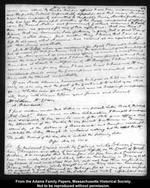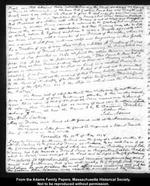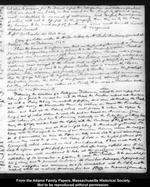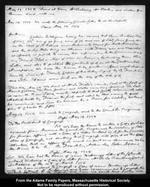May 14. 1778
man [Gentleman] you allude to, thinks that our Affairs have been mismanaged and the public Interest imprudently dissipated: and that many Persons have been improperly admitted to the public Purse. Another Gentleman, who has had the principal direction of the Purse, complains of reflections upon the French Nation and Government, Customs, manners &c. I wish there were no ground for any of these reflections: But one thing I know, that an immense Sum of Money is gone, that a great Sum of Money is still due. And another thing I know, that I am at a loss to discover what America has received as an equivalent for all these Sums and Debts.
As to Mr. Delap, whom you recommend for Agent, I have not a Sentiment but of respect for that Gentleman: but, Sir, the Appointment of continental Agents and the Management of commercial Affairs, is now in a new Channel under the orders of Congress, and I believe the Commissioners will not think themselves at Liberty to interfere in it. Mr. Bondfield I believe has a regular appointment, and for any thing I have ever heard behaves well. If any complaints should arise, the Commissioners will undoubtedly attend to them, with the utmost impartiality.
If you should determine homewards, be so good as to let me know as early as you can, and the part of the Continent to which you shall go.... Whether you go or stay, I wish you all happiness and prosperity, being with sincere Esteem your friend and Servant.
Mr. William McCreery at Bourdeaux.
I find written under this Letter, in my private Letter Book, the Words "Not Sent." Upon more mature deliberation, I thought it improper and dangerous, to lay open so much of the State of our Affairs and the Altercations of the Parties, to any private Gentleman in France, especially at the distance of Bourdeaux: and therefore resolved to withhold the Letter, though it contained nothing but the exact truth.
The public Business of this day May 14 included the following Letter
Passi May 14. 1778
Sir
In the several Cruises made by Captains Wicks, Johnson, Cunningham, Thompson and others, of our armed Vessells, on the Coasts of Great Britain, it is computed that between four and five hundred Prisoners have been made, and set at Liberty, either on their landing in France, or at Sea, because it was understood that We could not keep them confined in France. When Captain Wicks brought in, at one time, near an hundred, We proposed to Lord Stormont, an Exchange for as many of ours confined in England: but all Treaty on the Subject was rudely refused, and our
People are still detained there, notwithstanding the liberal discharges, We had made of theirs, as abovementioned. We hear that Captain Jones has now brought into Brest, near 200, which We should be glad to exchange for our Seamen who might be of Use in our Expeditions from hence: but as an Opinion prevails that Prisoners of a Nation with which France is not at War, and brought into France by another Power, cannot be retained by the Captors, but are free, as soon as they arrive, We are apprehensive that these Prisoners may also be sett at Liberty, return to England, and serve to man a Frigate against Us, while our brave Seamen, with a number of our Friends of this nation, whom We are anxious to sett free, continue useless and languishing in their Goals. In a Treatise of one of your Law Writers, entituled A Treatise of Prises or Principles of French jurisprudence concerning the Prizes, which are made at Sea printed in 1763 We find the above Opinion controverted page 129 . 30. in the following Words. "This seems to shew, that it is not true, as some Persons pretend, that as soon as a Prisoner, making his escape or otherwise, has sett his foot on Land, in a neutral Power, he is absolutely free from that moment. Indeed it will not be permitted to retake him, without the consent of that Power; but she would be wanting to the Laws of Neutrality, if [s]he should refuse her Consent. This is a Consequence of the Assylum due to the Ship in which was the Prisoner or the Hostage."
People are still detained there, notwithstanding the liberal discharges, We had made of theirs, as abovementioned. We hear that Captain Jones has now brought into Brest, near 200, which We should be glad to exchange for our Seamen who might be of Use in our Expeditions from hence: but as an Opinion prevails that Prisoners of a Nation with which France is not at War, and brought into France by another Power, cannot be retained by the Captors, but are free, as soon as they arrive, We are apprehensive that these Prisoners may also be sett at Liberty, return to England, and serve to man a Frigate against Us, while our brave Seamen, with a number of our Friends of this nation, whom We are anxious to sett free, continue useless and languishing in their Goals. In a Treatise of one of your Law Writers, entituled A Treatise of Prises or Principles of French jurisprudence concerning the Prizes, which are made at Sea printed in 1763 We find the above Opinion controverted page 129 . 30. in the following Words. "This seems to shew, that it is not true, as some Persons pretend, that as soon as a Prisoner, making his escape or otherwise, has sett his foot on Land, in a neutral Power, he is absolutely free from that moment. Indeed it will not be permitted to retake him, without the consent of that Power; but she would be wanting to the Laws of Neutrality, if [s]he should refuse her Consent. This is a Consequence of the Assylum due to the Ship in which was the Prisoner or the Hostage."
We know not of what Authority this Writer may be, and therefore pray a moment of your Excellencys Attention to this matter, requesting your Advice upon it, that if it be possible some means may be devised to retain these Prisoners, till as many of ours can be obtained in exchange for them. We have the Honor to be &c.
To Mr. De Sartine.
Benjamin Franklin
Arthur Lee
John Adams




